
Do you believe you are communicating clearly with people only to find out that you have misunderstood them or they didn’t understand you? I certainly have. Improving communication skills benefit both personal and professional relationships.
Learning and implementing these Best 4 Ways to Better Communication With Important People will enhance your skills. They helped me overcome communication challenges.
Talking with people about important issues didn’t come naturally for me. I grew up in a dysfunctional family. There was a lot of fighting and criticism. I learned to avoid expressing my opinions and got efficient at blocking my feelings from both myself and other people.
Using avoidance as self-defense made it impossible for me to know what I was feeling. Not being aware of my feelings blocked my instant reactions and silenced my ability to express myself honestly.
My communication skills have gotten better, and my relationships have improved because I’ve learned and implemented 4 steps.
Best 4 Ways to Better Communication with Important People
People need to sustain relationships with others. Using detailed, face-to-face talk is a productive way to get what you think you need and want from life. In situations where this isn’t possible, texting, email, and social media are also useful.
To do this, you use communication skills, which are a collection of behaviors. You learn many of these skills instinctively, and they operate automatically in most situations.
Unfortunately, some of the skills you learn are counterproductive, such as my intuitively learning avoidance to protect myself.

Developing Effective Communication Improves Relationships
Understanding what is happening in a situation works through your sense of self. Your self-sense is primarily a collection of your perceptions about your experiences and beliefs. Because of this, it’s not as easy as you think to see what’s happening and respond accordingly.
Instead of understanding the world the way it is, you view it the way you believe it is. Seeing this way creates distinctive gaps in communication between people.
Better Communication Closes Gaps
Communication gaps have come between family members and me through the years. I could tell many stories. I’m sure you could too. Right? Most likely, a story is coming to your mind right now.
One evening, after working a long day with customers in my hair salon, I was feeling tired and anxious. I was going to be late for a date. My daughter, Heather, and I had plans to have dinner and watch a movie together.
 I needed to call a customer before picking her up, but doing this would make me late. To save time, I decided to make the call and talk as I was driving. I was on the phone when she got in my car.
I needed to call a customer before picking her up, but doing this would make me late. To save time, I decided to make the call and talk as I was driving. I was on the phone when she got in my car.
Heather was angry because she expected me to be on time, which meant being available to her at the agreed time. She yelled at me, saying that she had been excited to talk to me and said she felt disappointed and unimportant.
Feeling frustrated and defensive, I explained my dilemma and how I tried to solve it to Heather.
After an upsetting drive to my house, we found the underlying cause of our communication challenge. We realized we both had un-communicated assumptions and expectations. These voids created gaps in understanding each other.
Using more congruent communication skills can bridge these deficiencies.
1. Communicate More Details
Communicating how you are feeling, what you want, and what you expect, are important details to include that help you avoid the gaps in communication.
Using clear communication creates better health by reducing stress.
Denying, ignoring, and not expressing your feelings can also lead to health issues. I developed the eating disorder, bulimia, in my late 20’s. To recover, I had to learn to tune into what I was feeling and to communicate more details of my thoughts and desires.
 As Heather and I discovered, communicating more details would have helped us avoid the emotionally difficult argument we had that night.
As Heather and I discovered, communicating more details would have helped us avoid the emotionally difficult argument we had that night.
I could have called her first and explained that I needed to make the phone call and why. She would have expected and understood my being on the phone when I arrived.
She could have expressed her excitement to talk to me and how she desired to have all of my attention for the evening.
Also, she could have explained the importance of her having calmer circumstances and more time, to acclimate to the change in environments after being alone all day to spending time with me.
Now, Heather and I connect, heart to heart, and enjoy mutual understanding, closeness, joy, and peace as a result of learning better communication skills.
Taking the time to communicate details can set the tone, mood, and expectations for the conversation.
2. Speak More Honestly
Being honest about how you feel, communicating your desires and expectations, and your assumptions aren’t always easy. Self=honesty can be the hardest of all. If you aren’t truthful with yourself, how can you be honest with other people?
Taking a few minutes to stop and ask yourself questions helps you learn what you need to know.
For better communication ask yourself these questions:
How am I feeling?
What are my expectations?
What are my assumptions?
After finding your answers, you are more aware of what’s going on with you, and this allows you to be more honest with yourself.
Self-honesty helps you be more honest with people.
3. Use Direct Communication
Beating around the bush means you are not communicating directly. I’m famous for doing this.
After asking for something indirectly, I leave the conversation believing the other person knows what I want. When the person doesn’t deliver what I asked for, I get upset. Later, I find out they didn’t know what I wanted because I didn’t ask directly.
Communicating my feelings honestly in the home where I grew up started fights. I felt criticized, disapproved of, and often punished when I tried to explain myself or question events.
Because of this, I became unable to communicate directly. There have been many times that I shook with fear when I had to ask someone to do something or to quit doing something. I didn’t want to make someone feel the way I felt growing up.
Communicating Directly Reduces Stress
 After working at home as a hairstylist for many years, I started working in a small salon near my home. The woman I worked with owned the salon. Only the two of us worked there.
After working at home as a hairstylist for many years, I started working in a small salon near my home. The woman I worked with owned the salon. Only the two of us worked there.
I noticed the salon smelled bad after a week. After hunting for the cause of the smell, I discovered it was my co-worker’s dirty towels.
Permanent wave solution and hair color are both foul-smelling chemicals and permeate a stylist’s towels after use.
It turned out that my coworker was leaving her dirty towels in the bin overnight after working all day. Because I worked in the afternoon and evenings, they smelled awful by then.
I was afraid to ask her to take them home. I know it sounds silly, but even this small request felt like a confrontation to me.
Unable to ask her directly, I made comments about how the salon smelled bad. She didn’t figure out what I wanted. I knew this because she didn’t take her towels home. Duh!
Finally, I was able to ask indirectly by including myself. I said, “I discovered that the bad smell in here is our dirty towels because they sit in our bins overnight. How about both of us take our dirty towels home each night?”
Sometimes “beating around the bush” works, however, you risk having complications. Using direct communication is best.
Clear communication prevents frustration, worry, hurt feelings, and arguments that occur with indirect miscommunication.
4. Allow Time for the Other Person to Process Information
After communicating how you feel or asking for something from someone, It’s important to give them time to process the information and questions.
People are thinking about and having feelings about what you are saying or asking as you are talking. They often don’t know how they feel until given a few moments, hours or sometimes days to process the information you provided them.
Give People Time to Respond
When you give people time to answer your question, offer a solution or opinion, or respond productively helps the communication create a better outcome.
Often, when I meet with my son, Logan, I want to connect and feel closer to him. As I drive to his house, I think about topics of conversation I will introduce to get conversations rolling.
As soon as he opens the door, I’m off and running, making comments and asking questions. Sometimes I hardly take a breath. Then I wondered why we had relationship problems.
We didn’t know Logan and Heather were on the autism spectrum until they were in their mid and late twenties. Being autistic, they require more time to process information. However, I also learned that people in general benefit from having the space to process what others communicate.
We have also learned that sometimes people with autism need help to determine the context of a situation. Heather gave an informative talk at Autism Speaks about the importance of understanding context.
Give people time to gather their thoughts so they can respond appropriately and participate in the discussions to create effective communication.
Using this skill, both in business and social situations helps reduce social barriers and gaps that can develop.
Open Communication Creates a Positive Outcome
Before I learned to use effective communication skills, I experienced some emotionally difficult moments as shown in the above stories. The most disturbing encounters were with important people in my life.
Several of those miscommunications took place when I tried to interact with my son, Logan. Our inability to adequately express our thoughts and emotions strained our relationship.
Through trial and error, we’ve both learned that successful communication requires people to be aware of each other’s feelings, body language, and thoughts.
Be mindful of each other’s circumstances, to assess what actions are necessary to solve a problem.
Good Communication Skills
A few years ago, Logan called me around 10 PM when I was still at my salon. I was exhausted after working all day. He was upset because somehow hundreds of ants were coming into his apartment through his bedroom window area. He asked me to come over and help him caulk the window.
 Of course, I wanted to help him. However, I felt so tired that my emotions shut off. Like a robot on autopilot, I told Logan that I would come over on my way home, but all I wanted to do most was go home to sleep.
Of course, I wanted to help him. However, I felt so tired that my emotions shut off. Like a robot on autopilot, I told Logan that I would come over on my way home, but all I wanted to do most was go home to sleep.
I had decided before I arrived that I was going to fix the problem as fast as I could. Logan had some caulk, and he needed me to apply it around the window. Because his fingers are small and permanently bent due to having Miller syndrome, he couldn’t do the caulking himself.
Because I was tired, I was rushing and careless. Logan waved his arms and raised his voice, frantically trying to get my attention, but I was ignoring him. I had unconsciously allowed my fatigue to take over my attitude and actions.
I was aware of Logan’s nonverbal body language in the back of my mind. However, I wasn’t patient enough to validate his concerns. I just wanted to get the job done and go home
If I had known the importance of using my three senses to look, listen and feel so I could have assessed the situation and gained a clear perspective, our communication would have been better. We would have had a positive experience.
By the time I finished the job we were both upset, and the level of tension was high. We both felt miserable when I left to drive home. Thinking about how unconsciously I had acted, I felt terrible. I could have handled the situation so much better.
After that unfortunate encounter, Logan and I learned to use better communication skills that improved our relationship significantly.
Use Your 3 Senses for the Best Communication
Make an effort to look, listen, and feel, as you observe a person’s verbal and non-verbal communications. Ask the person questions such as, “How are you feeling today?” Listen carefully to their answers and the tone of their voice.
Compare the person’s answers to the non-verbal communication you observe. Determine if their body language is congruent with what they’re saying. If you notice discrepancies, ask more questions to gain clarification of their mood.
Then, with a keen awareness, assess the information you gather to gain the correct perspective. As a result, you will know how to interact and what actions to take to achieve the results you want.
In Conclusion:
Learning and using the 4 skills I’ve talked about will create success in your relationships and expand into feeling more joy in your life.
Best 4 Ways to Communicate Better with Important People
-
- 1. Communicate more details
- 2. Speak more honestly
- 3. Be more direct
- 4. Allow the person more time to process the information
I hope these tools help you have more effective communication skills that will help your relationships.
Below is a link to videos of three talks about improving communication, by Heather, Logan, and Debbie:
Best Communication Tools to Help Your Relationships and Autism
Learn more:
10 Ways to Improve Your Communication Skills

